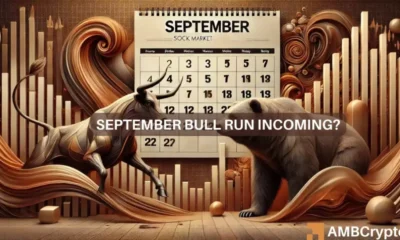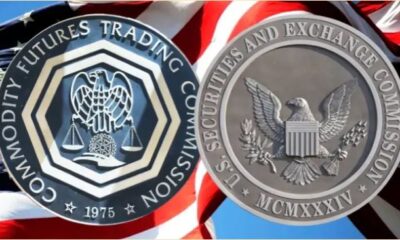Policy & Regulation
U.S. Political Prediction Markets :Why Kalshi’s Court Victory Matters

Credit : cryptonews.net
This week, Decide Jia Cobb of the US District Courtroom for the District of Columbia dominated in favor of the Kalshi prediction market in its case towards the Commodity Futures Buying and selling Fee. As professionals on this discipline, we imagine that Decide Cobb’s ruling could possibly be some of the vital within the historical past of the prediction markets.
Aaron Brogan is the managing legal professional of Brogan Legislation PLLCthe place he makes a speciality of cryptocurrency regulation and litigation. Matthew Homer is a VC investor and advisor to founders within the crypto area.
The CFTC, chaired by Rostin Benham, has taken an aggressive stance towards prediction markets. First, in January 2022, the Fee ordered crypto-based prediction market Polymarket to pay a $1.4 million advantageous and “stop offering entry to buying and selling on markets” in the USA. Then, in August 2022, the CFTC withdrew the extra conventional fiat-based prediction market PredictIt’s. no-action letter – an agreement not to sue a company – in an attempt to shut down the platform.
Kalshi was subsequent, however it was given safety as a result of it was legally registered as a regulated alternate (technically a chosen contract market or DCM). Inside this framework, Kalshi has the suitable to self-certify “occasion contracts,” and the CFTC might solely ban them if they’re opposite to the general public curiosity and contain particular actions, together with “struggle,” “terrorism,” and “gaming.” .
In September 2023, Kalshi tried to certify a market on which get together would management every Home of Congress. The CFTC rapidly issued one The order disapproved the contract and successfully banned Kalshi from itemizing occasion contracts primarily based on political outcomes.
The CFTC argued that Kalshi’s political contracts contain playing “as a result of taking a place on the Congressional Management Contracts would indicate one thing invaluable on the end result of a contest of others. [and] The Congressional Audit Contracts are primarily based on the end result of congressional election contests.”
This week in A Decide Cobb, a Biden appointee, disagreed, ruling that “Kalshi’s congressional audit contracts concern elections (and politics, congressional audit, and different associated subjects) and never unlawful actions or playing.”
The CFTC didn’t settle for this loss. As an alternative, it repeatedly argued at a listening to on September 12 that this movement needs to be stayed pending the attraction (a keep would imply the contracts stay offline).
The CFTC argued that regardless of Kalshi’s victory, the court docket ought to grant a keep as a result of “even a quick abstract of plaintiff’s contracts” would trigger “irreparable hurt.” Late Thursday, the D.C. Circuit Appeals Courtroom granted the CFTC a keep.
Why is the company so involved about these contracts even being listed? The reply is that the Fee is engaged in so-called ‘midnight regulation’.
You see, maybe realizing the weak spot of its arguments, the CFTC started hedging its bets in Might – by proposal to outline “gaming” by means of its regulatory energy. Within the Communication, the Fee seeks to broaden the scope of playing by defining it as follows:
“because the wagering or risking by any individual of something of worth on: (i) the end result of a contest of others; (ii) the end result of a recreation involving ability or likelihood; (iii) the efficiency of a number of individuals in a number of competitions or video games; or (iv) every other occasion or non-occurrence in reference to a number of matches or video games.”
Companies just like the CFTC are “impartial,” that means they don’t seem to be straight accountable to the president. Nevertheless, the president has the suitable to nominate nearly all of the 5 commissioners from his or her get together, and it’s typical for the chairman to resign when a brand new president takes workplace, as earlier chairman Heath P. Tarbert did so in 2021. Which means that the Benham Fee turned a lame duck when Biden withdrew from the elections on July 21.
We all know {that a} Republican CFTC would take a much less hostile perspective towards market forecasting than the present Fee, as a result of the present Republican commissioners informed us so. Commissioners Summer season Mersinger and Caroline Pham disagreed with the Kalshi order and the proposed rules, with Commissioner Mersinger arguing “It is arduous to not conclude [ ] That [the proposed rule] is motivated extra by an apparently deep-seated antipathy to occasion contracts than by reasoned evaluation.” Likewise, if Kamala Harris wins, she may have the chance to chart her personal course inside the Fee.
Right this moment’s CFTC is aware of this. If it had been to concede that Kalshi’s contracts are authorized underneath the present rule and anticipate the proposed rules, the following administration might take a special place. As an alternative, it’s doing all the things it will probably to stop these contracts from ever being supplied whereas it nonetheless can.
This can be a drawback. The Congressional Analysis Service has achieved that acknowledged that some discover midnight rulemaking troubling as a result of “an outgoing administration has much less political duty than an administration going through the potential of re-election.”
Nevertheless, there’s a vibrant spot. The CFTC’s efforts could also be in useless. In accordance with Decide Cobb’s ruling, the proposed rule might not prohibit occasion contracts involving elections in any respect.
Decide Cobb dominated that there was ‘a contract or transaction [only] contains an enumerated exercise if the occasion supplied and transacted as a part of that contract or transaction is said to that exercise,” and the Kalshi contracts didn’t relate to playing. The proposed rule adjustments the definition of gaming to “betting or risking one thing of worth [e.g. the outcome of a contest],” however it doesn’t change the “involvement” language that’s essential to Decide Cobb’s ruling. As a result of elections aren’t “the deployment of worth,” however moderately the underlying wrestle itself, they’re seemingly nonetheless outdoors the CFTC’s authority underneath Decide Cobb’s administration.
We can’t know for certain till the calls come out, however even throughout the ‘midnight rules’ some mild might have appeared. If Decide Cobb’s rule is discovered to preclude the CFTC’s proposed guidelines, contracts for election occasions might now be absolutely authorized.
We hope this marks a turning level within the regulation of those markets. Over the previous few years, there was a troubling development the place some federal regulators have chosen to ban markets they think about unfavorable, moderately than fulfilling their responsibility to manage them. U.S. customers ought to have the ability to work together with well-regulated U.S. entities, even in relation to new merchandise. It appears some regulators would moderately push this offshore. In our opinion this isn’t within the public curiosity.
Notice: The views expressed on this column are these of the creator and don’t essentially mirror these of CoinDesk, Inc. or its house owners and associates.
-

 Meme Coin6 months ago
Meme Coin6 months agoDOGE Sees Massive User Growth: Active Addresses Up 400%
-

 Blockchain12 months ago
Blockchain12 months agoOrbler Partners with Meta Lion to Accelerate Web3 Growth
-

 Videos12 months ago
Videos12 months agoShocking Truth About TRON! TRX Crypto Review & Price Predictions!
-

 Meme Coin1 year ago
Meme Coin1 year agoCrypto Whale Buys the Dip: Accumulates PEPE and ETH
-

 NFT9 months ago
NFT9 months agoSEND Arcade launches NFT entry pass for Squad Game Season 2, inspired by Squid Game
-

 Solana3 months ago
Solana3 months agoSolana Price to Target $200 Amid Bullish Momentum and Staking ETF News?
-

 Ethereum1 year ago
Ethereum1 year ago5 signs that the crypto bull run is coming this September
-

 Gaming1 year ago
Gaming1 year agoGameFi Trends in 2024



































